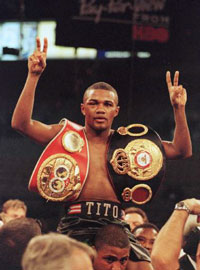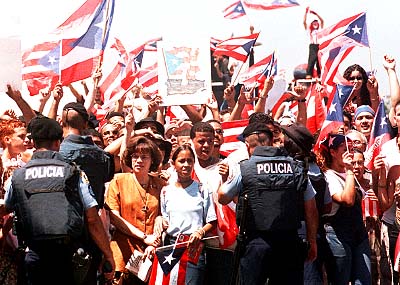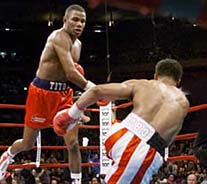|
Click below to view the other pages:
Home Page
Baseball
Basketball
Boxing
Athletic History and Cultural Identity
Related Links
This site was created for American Culture 213: Introduction to Latino Studies at the University of Michigan, Ann Arbor
|
El Museo Latino | Bibliography | Credits | Site Map
Biography and Impact
Considered by many the greatest boxer to come from Puerto Rico , Tito Trinidad is a huge celebrity in his country and has become an inspirational figure for all Puerto Ricans.
Felix “Tito” Trinidad was born in January 10, 1973 in Fajardo, Puerto Rico . He started boxing when he was 12 years old in Cupey where he was raised He immediately excelled winning 56 bouts and only losing 6 fights. He did not fight in the 92' Barcelona Olympics because of some disputes with the president of the amateur boxing federation, so facing much criticism he decided to go pro when he was 17. He quickly showed his talent by becoming champion after his fourth year of fighting. He also won his first 33 fights, knocking out 29 of them (He had a knockout percentage of 90%, one of the highest in boxing). He beat 3 fighters that had won gold medals in previous Olympics including a then undefeated Oscar de la Hoya, one of the greatest fighters of all time.

After the impressive win, Tito was greeted in the airport by 100,000 people which came to cheer and rejoice his impressive victory (10). The governor of Puerto Rico , Pedro Rossello announced that all public workers could have the afternoon off so they could great the champion. He said in a message “ Puerto Rico , recognizes the labor of a great champion, the labor that was viewed worldwide from Las Vegas . We have to be here because Tito is a great person, an example to our youth and a great boxing champion," as he welcomed Trinidad off the plane. The welcoming of Puerto Rico 's champion Felix "Tito" Trinidad was so big it has been compared to the receiving of Pope John Paul II when he visited the island in 1984. This victory made Tito into an iconic figure in Puerto Rico and made him an instant celebrity not only in P.R. but in the rest of the world too.

To the surprise of many, Trinidad suffered his first loss against Bernard Hopkins in 2001, in which Hopkins fought a perfect match against one of the best fighters in our modern era. After the loss Trinidad won 1 more match and then retired in 2002. After 1 year retirement he came back with style, defeating a tough opponent in October 2002. Currently, his professional record is 42 wins and only 1 defeat and shows signs of regaining the championship belt.
Despite a poor education, Tito has been known to be vocal about his feelings on the status of Puerto Rico's relationship with the United States. Of the current governor of the island, a Puerto Rican citizen said, "Pedro Rossello wants to make us Americans. But Tito shows we're Puerto Ricans," referring to the bid by governor Rossello to have Puerto Rico be the 51st state of US. Felix Trinidad is the pride of Puerto Rico , many people him consider him a true Puerto Rican seeking the best for his country (11). He gives his all he has in all his matches to try and represent PR in a good way. His people respect Tito because of his love for his country. In a press conference in Puerto Rico , Bernard Hopkins threw a Puerto Rican flag to the floor and insulted the island. The fans began to throw chairs and hit Bernard Hopkins for having insulted the flag and the island. This event shows the pride people have of being Puerto Rican and that they are not willing to be disrespected.

His humility and pride of being a Puerto Rican makes him an icon figure and role model in Puerto Rico, and its no wonder the entire country takes a break from their lives to watch him fight every time he steps in the ring. Not only does he fight for his country with his fists, but he has also appears as a board member for the "Children with Aids Foundation", an organization that helps kids around the world who have contracted the deadly disease.
Next Page: Cultural and Athletic Identity
Back to Boxing
|